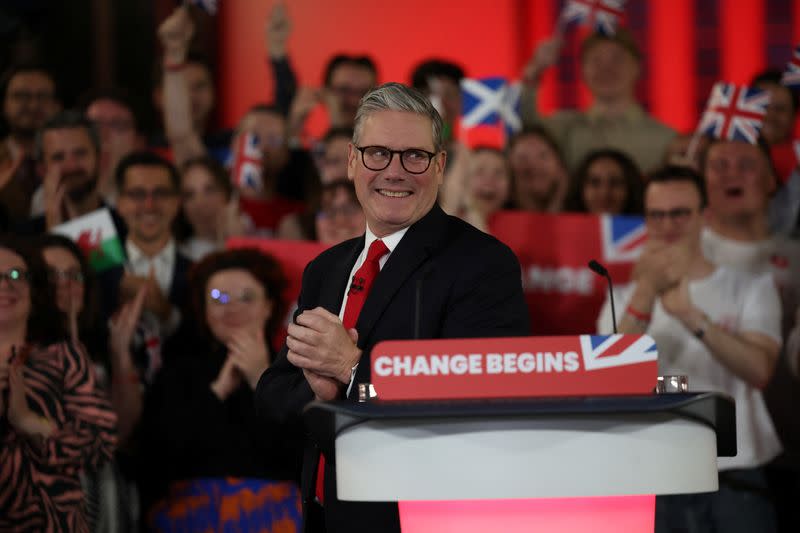Factbox-Challenges ahead for UK's next prime minister Keir Starmer

LONDON (Reuters) - Britain's next prime minister, Keir Starmer, wants to focus on long-term growth, but as he gets to grips with that challenge his first few months are packed with tough decisions.
Foreign affairs:
U.S. RELATIONS
Starmer has said he will "deal with whoever is the president", saying the relationship between Britain and the U.S. is "above the individuals".
Starmer is expected to attend a NATO Summit in the U.S. on July 9-11.
RELATIONS WITH EUROPE
Starmer has ruled out rejoining the EU single market or customs union but his party has said it is still possible to remove some trade barriers with bloc, to help smaller companies that have struggled with higher costs and paperwork.
Labour wants to seek a veterinary agreement that would reduce border checks on animal products, a hindrance for British farmers and importers, and mutual recognition of certain professional qualifications.
UKRAINE
Britain is due to give Ukraine 3 billion pounds ($3.8 billion) worth of military aid this year and the country is expected to continue to need support in the years to come. In its party manifesto, Labour said: "With Labour, the UK's military, financial, diplomatic and political support for Ukraine will remain steadfast."
GAZA
Starmer has said he wants to recognise a Palestinian state, but added that such a move would need to come at the right time in a peace process.
"We are committed to recognising a Palestinian state as a contribution to a renewed peace process which results in a two-state solution with a safe and secure Israel alongside a viable and sovereign Palestinian state," Labour said in its manifesto.
CHINA
Britain summoned China's ambassador earlier this year to say cyberattacks and reports of espionage links were not acceptable. The Labour Party has said it will bring a long term and strategic approach to managing relations with China.
On the domestic front, these issues require immediate attention:
TATA STEEL
The new government will need to sign the 500 million pound ($635 million) support package the previous government agreed with Tata Steel to help build a lower-carbon electric arc furnace.
Tata, Britain's biggest steel producer, started closing one of its carbon-intensive blast furnaces on Thursday while the shutdown of its other one is slated for September, resulting in the loss of up to 2,800 jobs at Port Talbot in South Wales.
Unions are hoping that the new government will seek an improved deal with Tata, which could prevent some job losses.
WATER
Sewage pollution caused by privatised water companies has become a huge issue.
On July 11, the regulator will decide whether to allow those companies to hike people's bills by double digits, in what could be one of the first big headaches for the new government.
The companies say they need the funds to improve infrastructure and stop sewage spills, but critics say they have spent the previous decade paying dividends instead of investing.
JUNIOR DOCTORS
Junior doctors have held strikes in England over the last 18 months, with the most recent ending on July 2. They want a 35% pay rise, having been offered a deal worth 10% on average.
The strikes have added to the strain on Britain's health service, with the number of people waiting for non-urgent treatment almost doubling to 8 million last year compared to four years earlier.
Before the election, Labour's health spokesman Wes Streeting said a Labour government would negotiate to end the strikes.
ROYAL MAIL
Royal Mail, which has delivered letters for 500 years, has agreed to be bought by Czech billionaire Daniel Kretinsky in a 3.57 billion pound deal agreed at the end of May.
Under the National Security and Investment Act, the government can scrutinise and block any acquisition which it believes could be a threat to national security.
Labour said in May it would ensure that the five-year assurances given by Kretinsky were adhered to if it won the election. Now it is in power, however, it could decide to look more closely at the deal.
SHEIN
The Chinese-founded fast fashion retailer Shein is said to have confidentially filed papers with Britain's markets regulator in June, kicking off the process for a potential London listing later in the year.
Labour has met with Shein and indicated its support for a deal that would be a boost for the UK market.
However concernts about Shein's labour practices, supply chain and use of an import tax exemption could become a problem for Labour.
($1 = 0.7836 pounds)
(Reporting by Sarah Young; Editing by Philippa Fletcher and Alex Richardson)

 Yahoo News
Yahoo News 
